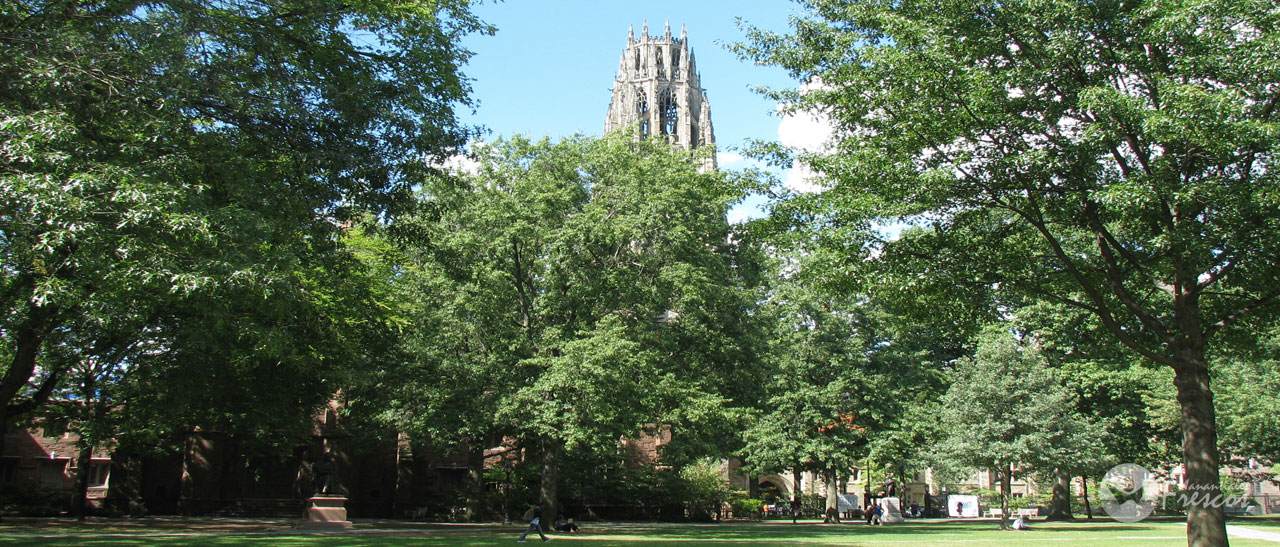 The Old Campus at Yale University (Photo by Dan Voll)
The Old Campus at Yale University (Photo by Dan Voll)
I want to thank you all for the privilege of being here tonight…. A couple of years after I graduated, Edith McMullen, director of the Teacher Preparation Program here said to me, “Are you still hanging around Yale?” I haven’t walked by her office recently, but if she knew that I have been hanging around Yale for 25 years, she might get a little upset!
My wife, Pilar, and I have had about two and a half days of tears, prayers, phone calls from all over the world at our house, reporters and television cameras. I will explain more of that as I speak, but I think that it is all very timely. So bear with as I may break down in the middle of speaking. I was up until 2:00 in the morning last night, preparing for this time, because my days have been so full.
May we bow our heads in prayer?
I am speaking tonight on the absolute necessity of evangelism. By this term, I am referring to our efforts in every variety as believers to publicly spread the Good News of the new life that is ours in Christ. Those efforts may earn us criticism because some people are offended by the open declaration of the truths of God’s Word. Nevertheless, as Paul states in Romans 1:16, “I am not ashamed of the gospel, because it is the power of God for the salvation of everyone who believes: first for the Jew, then for the Gentile. For in the gospel a righteousness from God is revealed, a righteousness that is by faith from first to last, just as it is written: ‘The righteous will live by faith.'”
I know as one who has been around Yale for 25 years that it is easy for those of us who are believers here to be embarrassed about our faith in Christ. We stand on the grounds of a major university that was founded specifically to teach the wisdom of Christ Jesus. But another wisdom prevails in this place today, one that has little room for Jesus except as a historical curiosity. We who believe in Christ are also viewed as a curiosity—if not an offense—by those who do not so believe. Make no mistake, Paul meant exactly what he wrote in I Corinthians 1:21, “For since in the wisdom of God the world through its wisdom did not know him, God was pleased through the foolishness of what was preached to save those who believe.” To those who do not believe, the Gospel of Christ is foolishness—because they will not and do not understand it. We cannot change this fact. No matter how much we may want to dress up what we believe to seem wise in the eyes of those who do not believe, we cannot do so. But to those who do believe our words, the Gospel of Christ may be the means of their discovery of a life they never knew existed. Unfortunately, when we preach, there is no way to know in advance who will and who will not believe. Only God can see what is hidden in people’s hearts.
In September 1969, a young man from Wenham, Massachusetts entered Harvard as a freshman. He was a direct descendant of the Puritans and had six ancestors on the Mayflower. He had attended the Congregational Church, the church founded by the Puritans, for all of his youth—yet he had never heard or understood what it was to be born again, or to know the forgiveness of his sins. In his first week at Harvard, however, he met believers in Jesus, including Andrew Burrows, a member of Yale’s Class of 1966. Those believers invited him to come to a Bible study on campus. The young man went to that study and brought along a friend. When Andrew and the others spoke to him about Christ, the young man replied that he was already a Christian, but that his friend was not.
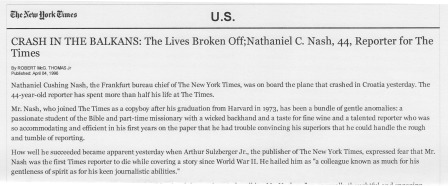
The group of believers therefore began to speak to that friend about the new life that is ours in Christ, with the young man listening in. As they spoke to his friend, it was the young man, not the friend, who responded that he now realized that he really wasn’t a Christian. He did not know Jesus in the way that they were describing, but he wanted to know Him. That young man received Jesus Christ as his Lord and Savior that very night. On Wednesday of this week, that young man died when his plane crashed into a mountainside in Bosnia, cutting his life short at the age of 44. Nathaniel Cushing Nash the 5th had 27 years of walking with and serving Jesus, for most of those years as a reporter in New York, Washington, Latin America, and then in Europe as the Frankfurt bureau chief of The New York Times—and as their economic correspondent covering everything from Paris to Moscow.
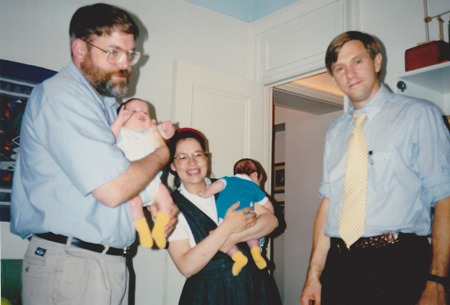 Chris & Pilar White with twins,
Chris & Pilar White with twins,
and Nathaniel Nash
More than that, Nathaniel was a very dear friend to me and to many others. He was present at the very first Bible study I attended my freshman year at Yale in September 1971. Someone from Harvard helping with Bible studies at Yale? “With God, all things are possible!” Nathaniel was my roommate in Yonkers for several years. In 1973, he and I and two others from Yale were interviewed over dinner in Manhattan by a New York Times reporter who wanted to talk with us about our faith in Christ. After dinner, Nathaniel helped me work out the details of a tune I wrote that night for Psalm 133: “Behold, how good and how pleasant it is for brethren to dwell together in unity!”
Nathaniel was an avid gardener and a gourmet cook who prepared meals for, among others, at least one Colombian Ambassador to the United Nations and one Vice President of the United States. He was also an expert tennis player whose father long hoped that he would go professional, only to be disappointed when he chose instead to serve Jesus, and to enter the field of journalism. Last night, on the CBS evening news, Dan Rather described Nathaniel as one of “the world’s greatest reporters.” Tom Brokaw devoted 3 minutes of the NBC evening news to the story of his life and his death, and ended the segment with his own personal moment of silence. Above all, Nathaniel was a lover of Jesus Christ, a man of prayer and a diligent student of the Bible. He was also a lover of people, young and old, barbers, gardeners, or Senators. All of this would never have been if someone had not had the courage to tell that young student at Harvard about Jesus Christ 27 years ago.
Last weekend, while my wife and I were visiting friends in Washington, D.C., the Lord put some verses on my heart as I was praying about this evening. If you have a Bible, would you please open it, and follow along as I read Psalm 49, verses 7-20 in The New International Version:
—the ransom for a life is costly, no payment is ever enough—that he should live on forever and not see decay.
For all can see that wise men die; the foolish and the senseless alike perish and leave their wealth to others.
Their tombs will remain their houses forever, their dwellings for endless generations, though they had named lands after themselves.
But man, despite his riches, does not endure; he is like the beasts that perish.
This is the fate of those who trust in themselves, and of their followers, who approve their sayings.
Selah Like sheep they are destined for the grave, and death will feed on them. The upright will rule over them in the morning; their forms will decay in the grave,
far from their princely mansions. But God will redeem my life from the grave; he will surely take me to himself. Selah
Do not be overawed when a man grows rich, when the splendor of his house increases; for he will take nothing with him when he dies,
his splendor will not descend with him. Though while he lived he counted himself blessed—and men praise you when you prosper—
he will join the generation of his fathers, who will never see the light [of life]. A man who has riches without understanding is like the beasts that perish.
None of us knows how long we have to live. My only brother received Christ as his Savior as a 12-year-old boy, the same summer as I did, in a renovated barn on a farm in New Hampshire. Unfortunately, he began to slip away from faith in Christ when he entered high school. By the time he arrived as a freshman at Yale in 1973, faith in Christ was only a memory from his past. Nevertheless, he had every prospect of success here, a genius-level IQ, an 800 on his Physics achievement among others, everything a freshman should have to do well at Yale—except Jesus.
Some of his roommates had the bad habit of using drugs as did many back then, and my brother went to their parties, though he never took their drugs. Then, at a party during his sophomore year, someone decided to play a trick on him by mixing a large dose of speed in an alcoholic drink which they handed to him. He drank what he was given, suspecting nothing, and suffered a drug-alcohol reaction that landed him that night in Yale-New Haven hospital. He stayed in many other hospitals and institutions for most of the rest of his life, a life which ended at the age of 33 when his heart stopped.
It was done as a joke, but my brother could never return to Yale, though he tried many times. He could never get his life and mental faculties sufficiently back together to complete his degree. In fact, he could never again live on his own. For 12 long years, my brother was never seen by anyone to smile. But, in the mercy of our gracious Lord, Gregory came back to Jesus in the last few months before he died—and he smiled once again. When he did die, everyone at his funeral in the little mountain town of Silverton, Colorado knew that he had entered eternal life with Christ—but he could never again get back his life here on earth.
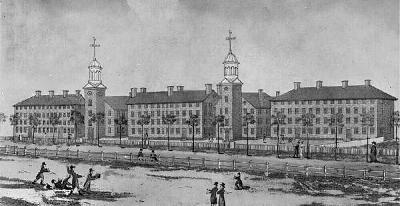 Yale College in 1807 (Lithograph, Public Domain)
Yale College in 1807 (Lithograph, Public Domain)
The King James Version for verse 8 of Psalm 49 reads, “For the redemption of their soul is precious, and it ceaseth for ever.” I will say it again, none of us knows how long we have to live. Nor do we know how long those around us will have to live either. Many graduates of this university have gone on to grow rich, to have the splendor of their houses increase, and even to name lands and corporations after themselves. But the Scriptures reveal that a life lived without Jesus Christ might as well never have been lived at all. Who remembers who was the greatest American doctor of 1936, or the most successful trial lawyer of 1892, or the valedictorian of Yale’s class of 1783? Who cares? Success in this life has value for a little while—but, as the poem says, “‘Tis one short life, t’will soon be past, and only what’s done for Christ will last.”
The Scriptures do not call us to be lazy or careless about anything we do as servants of the Lord. This includes our studies, our careers, and everything else we undertake to do, including our families. Nathaniel Nash and I both have three young children, and in both of our families we have twins. In fact, we are commanded in Ecclesiastes 9:10, “Whatever your hand finds to do, do it with all your might.” I can tell you personally that Nathaniel did just that—and the Lord blessed him for it. But in all his concern about making the most of his natural opportunities, and he did, Nathaniel never forgot to make the most of his spiritual opportunities. Only the Lord knows how many people learned more about Jesus because they heard the words and witnessed the life of this intrepid reporter.
The greatest gift that you as a believer in Jesus Christ can give to your friends and classmates is to tell them what you know about Him, what He has done for you, and how He has changed your life. Who knows? They may believe you and come to know Him, too. If you tell them, at least they will have the chance to decide for themselves. If you don’t, God will have to use someone else—if He is to get through to them.
“For the redemption of their soul is precious, and it ceaseth for ever.” Do you remember what Jesus said about the good shepherd who had one hundred sheep and lost only one of them? He was willing to search hill and dale to find that one sheep, and that is why some of us are here tonight. He left the ninety nine others to do so. What are we willing to leave so that some lost sheep might come home to Jesus? Are we willing to speak to those closest to us about our Good Shepherd? Are we willing to support the public preaching of the Gospel of Jesus Christ, and to forget about any personal embarrassment we might feel as a consequence? Who was more embarrassed than Jesus when He was hung naked and bleeding on a cross, sentenced to die for crimes He had never committed?
The Bible says in Hebrews 12:2 that Jesus “despised” the shame of the cross—he was not a masochist. But He knew that nothing less than his own shameful death could save sinners like us from eternal loss, and at the same time change us into creatures fit for the Kingdom of Heaven. He loved us, but do we love those around us in this dying world enough to speak up for Him? At stake is eternal life or eternal death for somebody else. If we belong to Jesus, we are safe in His arms. But what about those who don’t know Him yet? Isn’t their redemption precious, just as precious as ours?
Maybe they won’t listen to us, just as they would not listen to Jesus. Maybe they will mock us, as they mocked Him. Maybe they will despise us, but they also despised Him. And because He is with us, maybe they will believe—not because we are wise or powerful or eloquent, but because “God is moving, by His Spirit, moving in all the earth.” All He asks us to do is to get with the flow of His Spirit. Redemption wasn’t our idea, it was His. Salvation isn’t our work, it’s His—to draw a people for Himself out of every nation, kindred, tongue, and tribe. If you haven’t already, will you accept tonight the privilege of becoming a co-worker with Christ, one who is not ashamed of His Good News, for “it is the power of God for the salvation of everyone who believes?”
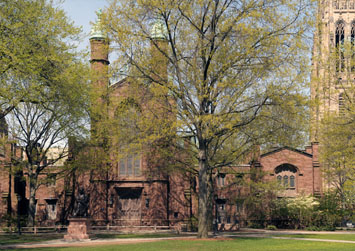 Dwight Hall at Yale
Dwight Hall at Yale
(Photo credit: Michael Marsland for Yale University. Original)
One thing I can tell you from personal experience, and with this I will conclude. There are few joys greater than seeing someone you know and care for born into the Kingdom of Heaven. Someone who didn’t understand, now understands. Someone who hated Jesus, like Saul, now loves Him, like Paul. I will close with the advice that Timothy Dwight, one of Yale’s greatest presidents, gave to the students present at the Baccalaureate address of 1814. “Christ is the only, the true, the living way of access to God. Give up yourselves therefore to Him, with a cordial confidence, and the great work of life is done.” Many are in heaven today because President Dwight was not ashamed of the Lord who saved him. If you will also refuse to be ashamed of the One who saved you, you can be sure that on the Judgment Day, someone—and maybe a lot of “someones”—will walk up to you. They will shake your hand, or hug you, and express their gratitude that you introduced them to Jesus—by your life, by your words, and by your prayers. What greater reward can you have from this life than that?
Copyright ©1996 Christopher N. White
(Message given at Good Friday gathering of undergraduates, graduate students, and faculty at Yale, April 5, 1996)

